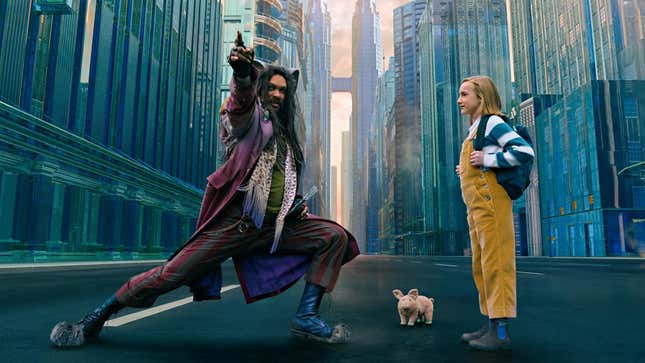
Director Francis Lawrence embraces his inner Barry Sonnenfeld with the highly stylized spectacle of Slumberland. Yet there’s a surprising reluctance to latch onto the expanse of emotion lying beneath his picture’s sense of wonder. Even with an elongated running time that undermines its thematic impact and tests the audience’s patience, this may be the best adaptation yet of Winsor McCay’s comic strip Little Nemo In Slumberland. Then again, that bar has been set low since the 1989 animated feature Little Nemo: Adventures In Slumberland similarly failed to tap into the tale’s true power.
11-year-old Nemo (Marlow Barkley) lives with her caring, widowed father Peter (Kyle Chandler) on a remote island somewhere off the Northern coast. They spend their days sailing, cooking, and tending to their lighthouse home. He lulls her to sleep each night with tall tales of treasure hunting, and adventures with his best friend Flip (Jason Momoa)—a rascal dressed like a bohemian carnival barker with ram horns, long stringy hair, and fangs for teeth. One stormy night after recounting one of those thrilling bedtime stories, her dad dies during a rescue call on the tumultuous seas.
Nemo, now orphaned, is sent to live with her estranged, workaholic uncle Philip (Chris O’Dowd), who struggles to relate to his new charge. After one nightmarish day after another, her dreams become an escape where she aspires to reunite with her dad. Instead, they guide her down a treacherous path involving a map to wish-granting pearls, and once again, her dad’s friend Flip, who’s lost his memory. Meanwhile, a badass bureau agent (Weruche Opia) and an otherworldly smoke monster pursue them, threatening to derail their mission.
Buoyed by Barkley and Momoa’s elevated performances, David Guion and Michael Handelman’s script nimbly handles both buddy cop and road trip conventions that hit predictable beats with charm and savvy. Barkley turns in open-hearted work, unearthing hidden facets of her character’s conundrums. Momoa shows off a gift for a broad comedy, fearlessly delivering a goofy and sweet swagger. Dream scenarios, set in wacky worlds where a pompadour-sporting toddler drives a garbage truck and a hockey fan rides a giant goose through snowcapped mountains, become set pieces where the actors let loose, showcasing their chemistry.
Pinar Toprak’s score channels thematic wit and whimsy, feeling playful and poignant, soaring and sentimental, revealing and resourceful. Jo Willems’ enchanting cinematography pushes a saturated color scale and palette, bursting with life, capturing blossoming dream states like pop art. Combined with Dominic Watkins’ production design and Trish Summerville’s costume design, it becomes a sumptuous symphony in these vibrant environments, borrowing aesthetic aspiration from the likes of Pushing Daisies and Men In Black to augment the picture’s tonal bandwidth and sentimental scope.
While dream sequences look absolutely spectacular (thanks to polished work from visual effects supervisor Adrian De Wet), the filmmakers prove more conservative with the narrative itself. Though they’re slavish to rules in terms of the universe, continually reminding the audience of them whenever and wherever possible, these are dreams we’re talking about—and with that comes dimensions that are misshapen, unruly, or unwieldy. Consequently, these sequences are more coherent than crazy, occasionally making self-aware nods to their textbook psychological connotations, and leaving audiences yearning for more imaginative parameters. They can’t shake a perfunctory “insert pursuit or disruption here” quality rather than evoke the rapturous spontaneity of actual dreams.
The picture’s evocative motivational drive is further dulled by its almost two-hour running time. The waking world and the dream world blend uneasily in the film’s attempts to balance real emotional stakes with surreal physical ones. It’s ironic that the characters struggle with the complexities of life while the filmmakers themselves struggle with their material’s emotional power. That’s not saying heartrending and heartwarming aspects aren’t there. They assuredly are, since much of the plot comes with a heavy sentimental component, further amplified since it’s happening to a helpless child and her unmoored uncle. Unfortunately, it proves subdued when it should be searing.
Slumberland doesn’t tread lightly when it comes to symbolism and allegory; the lighthouse and smog squid as metaphors for parenthood and grief, respectively, are obvious. But its surprisingly endearing rebellious spirit and anti-establishment messaging (from Nemo’s unconventional upbringing to Flip’s defiant stance on cops) both come across clearly. These notions, as well as the coping mechanisms they speak to, are cleverly conceived and resonant for both kids and adults. Playing like an amalgam of Monsters, Inc. and Inception, this family-friendly fantasy thankfully doesn’t put audiences to sleep, but neither does it draw us into its dreamy sensation.